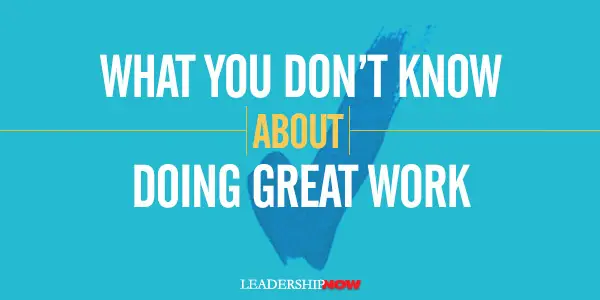 |
 |
02.07.18

What You Don't Know About Doing Great Work
W Morten Hansen thinks the way we work is broken. Not only that but how we manage and reward work, and how our culture recognizes hard work. What we call hard work may not be our best work. In Great at Work, Hansen reports on a five-year survey of 5,000 managers and employees, including sales reps, lawyers, actuaries, brokers, medical doctors, software programmers, engineers, store managers, plant foremen, nurses and even a Las Vegas casino dealer. They discovered seven work smart practices. The first four involves mastering your own work, and the last three encompasses mastering working with others. Do Less, Then Obsess The common practice he found among the highest-ranked performers in the study was that they carefully selected which priorities, tasks, meetings, customers, ideas or steps to undertake and which to let go. They then applied intense, targeted effort on those few priorities in order to excel. He found that there were just a few key work practices related to this selectivity that accounted for two-thirds of the variation in performance among our subjects. So working smarter boils down to “maximizing the value of your work by selecting a few activities and applying intense targeted effort.” If we wish to perform better, we should examine our own selectivity process. But that’s only half of it. Not only do we pick a few priorities, but then we must “obsess over your chosen area of focus to excel.” “As few as you can, as many as you must.” Redesign Your Work Redesigning work is about creating more value for the same amount of work done. That requires an outside-in view “because it directs attention to the benefits our work brings to others. The typical inside-out view, by contrast, measures work according to whether we have completed our tasks and goals, regardless of whether they produce any benefits.” Hunt for value. Opportunities exist at “pain points.” Ways to create value include: eliminating existing activities of little value, increasing existing activities of high value, creating new activities of high value, improving quality, and doing existing activities more efficiently. Don’t Just Learn, Loop The Learning Loop means you learn while you work. Doing great work requires that you are getting feedback every day. In his study, 74 percent of the top performers reviewed their work in an effort to learn and improve. On 17 percent in the underperforming category did. Aim for Passion and Purpose You can have one without the other, but we should aim for both. “Purpose and passion are not the same. Passion is ‘do what you love,’ while purpose is ‘do what contributes.’ Purpose asks, ‘What can I give the world?’ Passion asks, ‘What can the world give me?’” With passion and purpose working for you, you bring more energy per hour of work. Passion alone doesn’t guarantee success or happiness. You may need to take a wider view of what ignites you. “Passion can also come from: success, creativity, social interactions, learning, and competence. Expand your circle of passion by tapping into these dimensions.” Become a Forceful Champion Getting our work done often hinges on our ability to gain the support of others. Getting other people on board takes more than just explaining the merits of your project. You’ve got to inspire them. The best advocates in their study master two skills in this regard. “They inspired others by evoking emotions, and they circumvented resistance by deploying smart grit.” Beyond just appealing to people’s emotions, they persevere taking into the account the perspective of the people they’re trying to influence and devising tactics that will win them over. Not just grit, but smart grit. Enlist others to help move your project forward. “Too many people try to get others to change by doing all the convincing themselves. They become lone crusaders for their efforts—and they exhaust themselves in the process.” Fight and Unite The ability to lead teams is crucial to great work. As a matter of necessity, much of this work takes place in meetings. The trick is to encourage constructive fights in meetings with cognitive diversity. Team members need to “debate the issues, consider alternatives, challenge one another, listen to minority views, scrutinize assumptions, and enable every participant to speak up without fear of retribution.” But after that is done, the team needs to come to a decision quickly and commit to a decision. You must unite. “That means people on a team have to commit to a decision—to agree to it and exert effort to implement it.” Adopt Disciplined Collaboration Hansen has identified two sins of collaboration: undercollaboration and overcollaboration. Some people talk too little, and some people talk too much across teams and departments. The goal isn’t collaboration, but better performance. He recommends disciplined collaboration. That is, “they carefully select which collaboration activities to participate in (and reject others), and follow five specific rules to make the chosen activities a success: establish a compelling reason for the collaboration, craft a unifying goal that excites, reward people for results, commit full resources or kill it, and tailor trust boosters to solve any trust issues quickly. Hansen’s research has statistically linked superior performance to the daily practice of the above seven principles. Fresh and compelling examples are used throughout to fully illustrate the seven smart work practices. 
Posted by Michael McKinney at 09:06 PM
|
BUILD YOUR KNOWLEDGE
 

How to Do Your Start-Up Right STRAIGHT TALK FOR START-UPS 
Grow Your Leadership Skills NEW AND UPCOMING LEADERSHIP BOOKS 
Leadership Minute BITE-SIZE CONCEPTS YOU CAN CHEW ON 
Classic Leadership Books BOOKS TO READ BEFORE YOU LEAD |